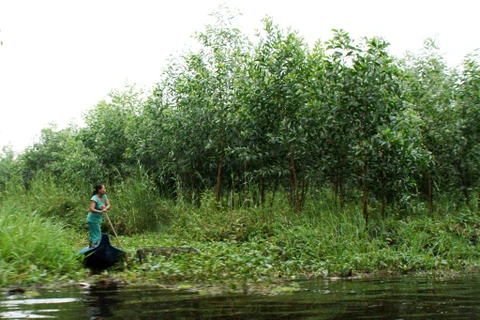Ca Mau (VNS/VNA) – The Mekong Delta province of Ca Mau is strengthening measures to develop craft villages as they face a shortage of materials and unstable prices for their products.
Under the province’s plan to 2020, it targets having 37 craft villages next year, up from the current 13.
The craft villages make dried fish, dried shrimp, dried banana, sedge mats, chopsticks and other products.
A shortage of materials, unstable product prices, a small quantity of products, and low competitiveness are all contributing to the decline of craft villages, according to the province’s Department of Agriculture and Rural Development.
Tan Thanh sedge-mat weaving village in Ca Mau city’s Tan Thanh commune, which was once well known in the delta for its high quality, has cut back its production because customers now prefer using bamboo mats and mattresses.
Nguyen Van Tran Vu, whose family has made sedge mats for three generations in the village, said that in the past especially on festival occasions such as Tet (Lunar New Year), his family could not meet the high demand for sedge mats.
Now, he sometimes has only a few customers ordering mats. “Sedge mats are difficult to sell and can't compete (with similar products),” he said.
Cao Thị Loan, who has made sedge mats since she was young, said most youth were working at companies or doing other jobs that offer higher incomes.
The lives of sedge-mat makers are unstable because of the lack of work, she said.
The lack of input materials, such as bamboo for weaving bags, baskets and other products, has reduced employment for workers in craft villages.
In addition, many households in craft villages have not treated their waste properly, causing pollution.
Nguyen Van Tranh, deputy director of the department, said the department was working with agencies to transfer advanced production technology and waste treatment techniques to households in craft villages.
Several craft villages have restructured their operations to meet market demand, including establishing co-operatives or clubs to work with companies to produce and sell products.
In Thoi Binh district’s Tan Bang commune, where many households make weaving products like bags, baskets and other products from bamboo, the households have also faced a shortage of input materials.
In 2016, the commune set up a club that teaches people with disabilities to weave bamboo products and make other handicraft products.
The club, which is open to poor women, has cooperated with a company in HCM City since last year. The company supplies materials for the club to make bags from dried water hyacinth or dried banana ropes. Club members can earn about 18,000 VND for each bag.
Cao Ngoc Pham, chairman of the commune’s Fatherland Front Committee, said the club and the company would expand production and create stable jobs for the club members.
Tran Hong Quan, Vice Chairman of the provincial People’s Committee, noted that developing craft villages is really necessary since they make use of local materials, create jobs for local residents and preserve cultural characteristics of the area.
To increase income for workers, the province also plans to strengthen ties with tourism companies to promote products from craft villages.-VNS/VNA
Under the province’s plan to 2020, it targets having 37 craft villages next year, up from the current 13.
The craft villages make dried fish, dried shrimp, dried banana, sedge mats, chopsticks and other products.
A shortage of materials, unstable product prices, a small quantity of products, and low competitiveness are all contributing to the decline of craft villages, according to the province’s Department of Agriculture and Rural Development.
Tan Thanh sedge-mat weaving village in Ca Mau city’s Tan Thanh commune, which was once well known in the delta for its high quality, has cut back its production because customers now prefer using bamboo mats and mattresses.
Nguyen Van Tran Vu, whose family has made sedge mats for three generations in the village, said that in the past especially on festival occasions such as Tet (Lunar New Year), his family could not meet the high demand for sedge mats.
Now, he sometimes has only a few customers ordering mats. “Sedge mats are difficult to sell and can't compete (with similar products),” he said.
Cao Thị Loan, who has made sedge mats since she was young, said most youth were working at companies or doing other jobs that offer higher incomes.
The lives of sedge-mat makers are unstable because of the lack of work, she said.
The lack of input materials, such as bamboo for weaving bags, baskets and other products, has reduced employment for workers in craft villages.
In addition, many households in craft villages have not treated their waste properly, causing pollution.
Nguyen Van Tranh, deputy director of the department, said the department was working with agencies to transfer advanced production technology and waste treatment techniques to households in craft villages.
Several craft villages have restructured their operations to meet market demand, including establishing co-operatives or clubs to work with companies to produce and sell products.
In Thoi Binh district’s Tan Bang commune, where many households make weaving products like bags, baskets and other products from bamboo, the households have also faced a shortage of input materials.
In 2016, the commune set up a club that teaches people with disabilities to weave bamboo products and make other handicraft products.
The club, which is open to poor women, has cooperated with a company in HCM City since last year. The company supplies materials for the club to make bags from dried water hyacinth or dried banana ropes. Club members can earn about 18,000 VND for each bag.
Cao Ngoc Pham, chairman of the commune’s Fatherland Front Committee, said the club and the company would expand production and create stable jobs for the club members.
Tran Hong Quan, Vice Chairman of the provincial People’s Committee, noted that developing craft villages is really necessary since they make use of local materials, create jobs for local residents and preserve cultural characteristics of the area.
To increase income for workers, the province also plans to strengthen ties with tourism companies to promote products from craft villages.-VNS/VNA
VNA
























